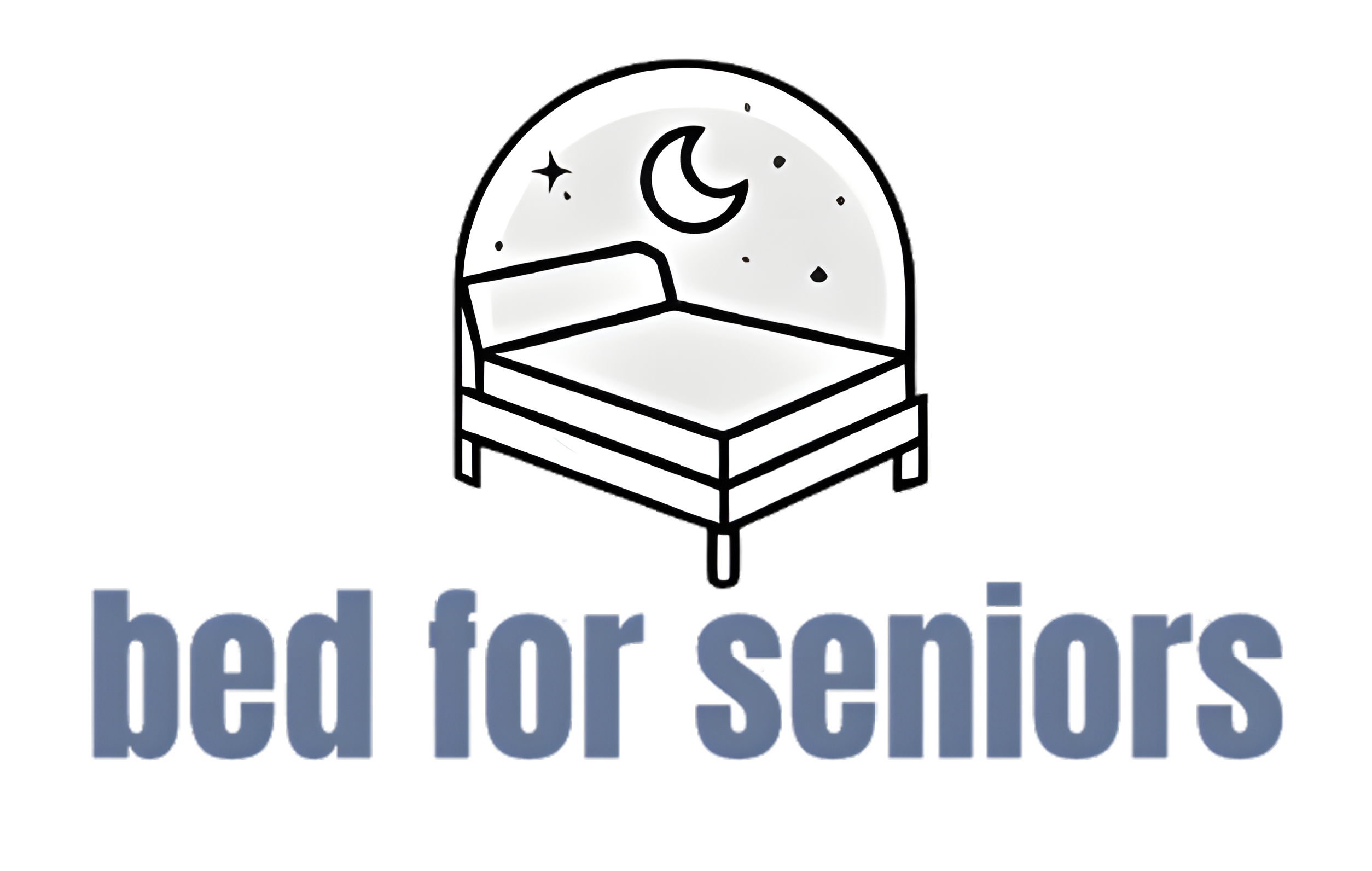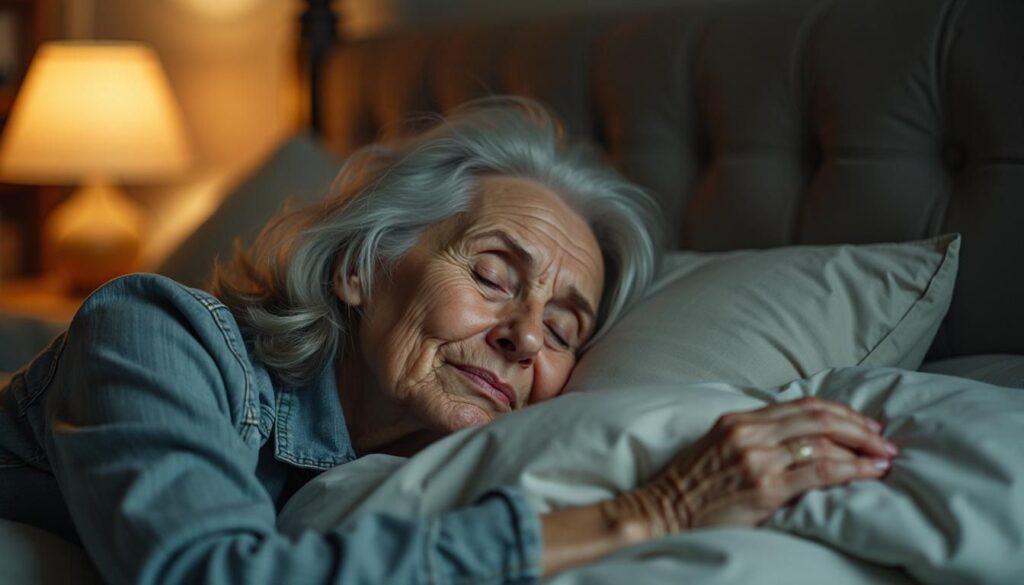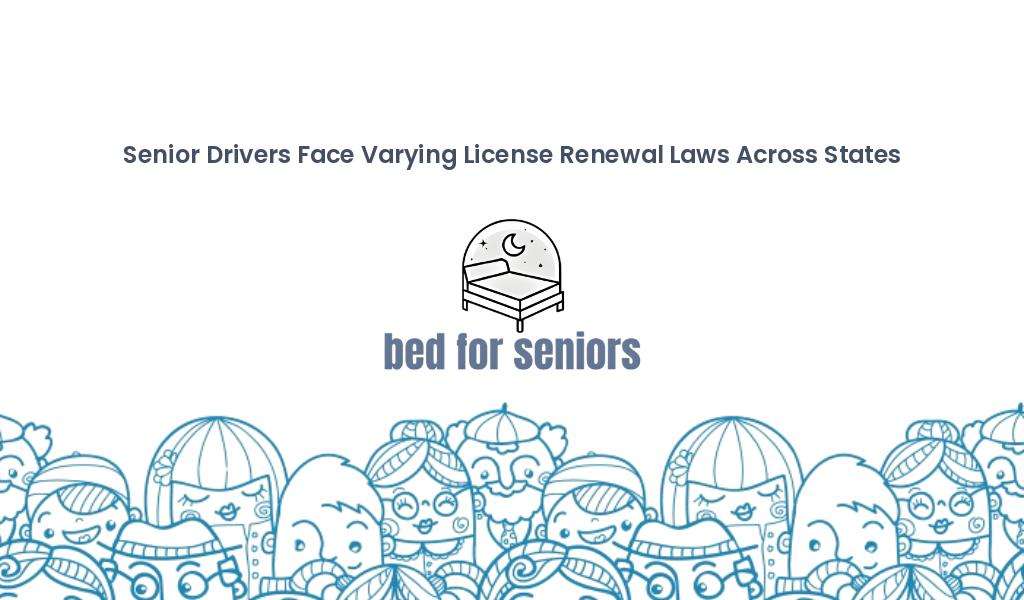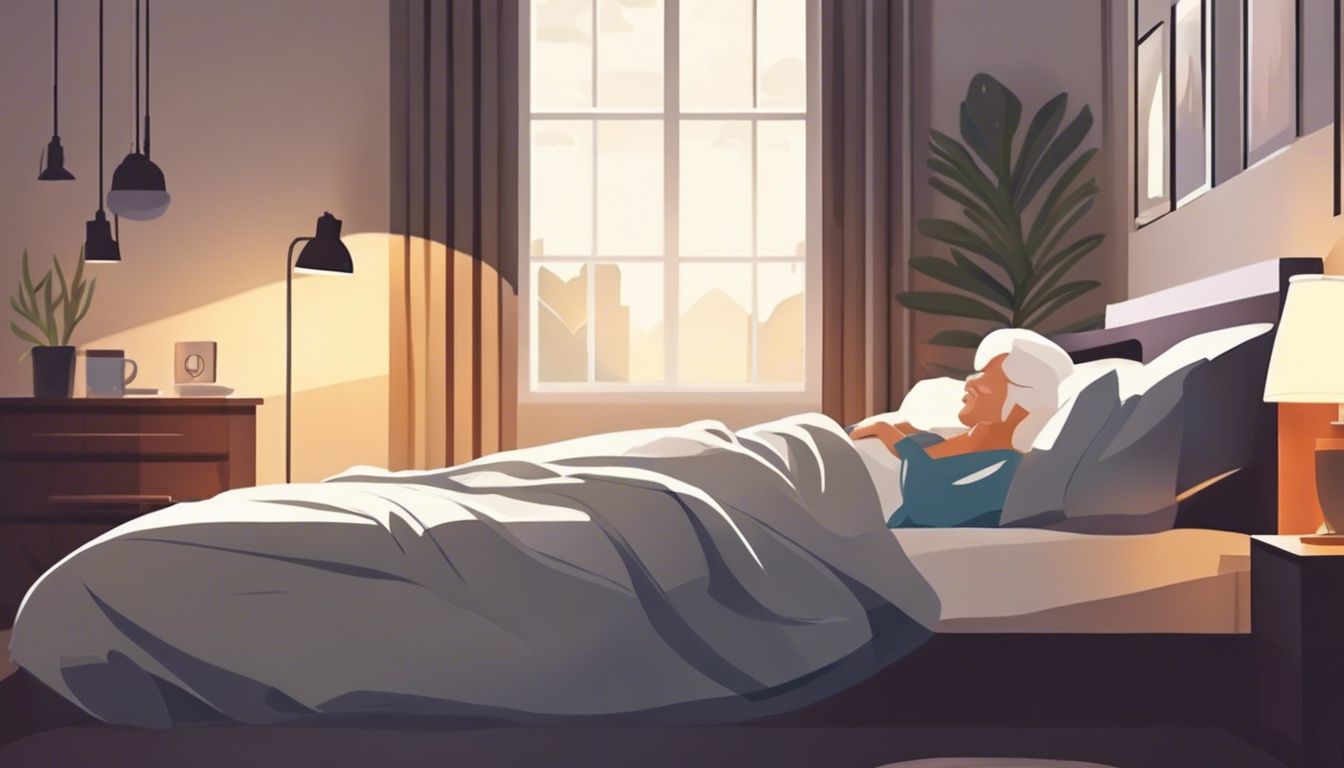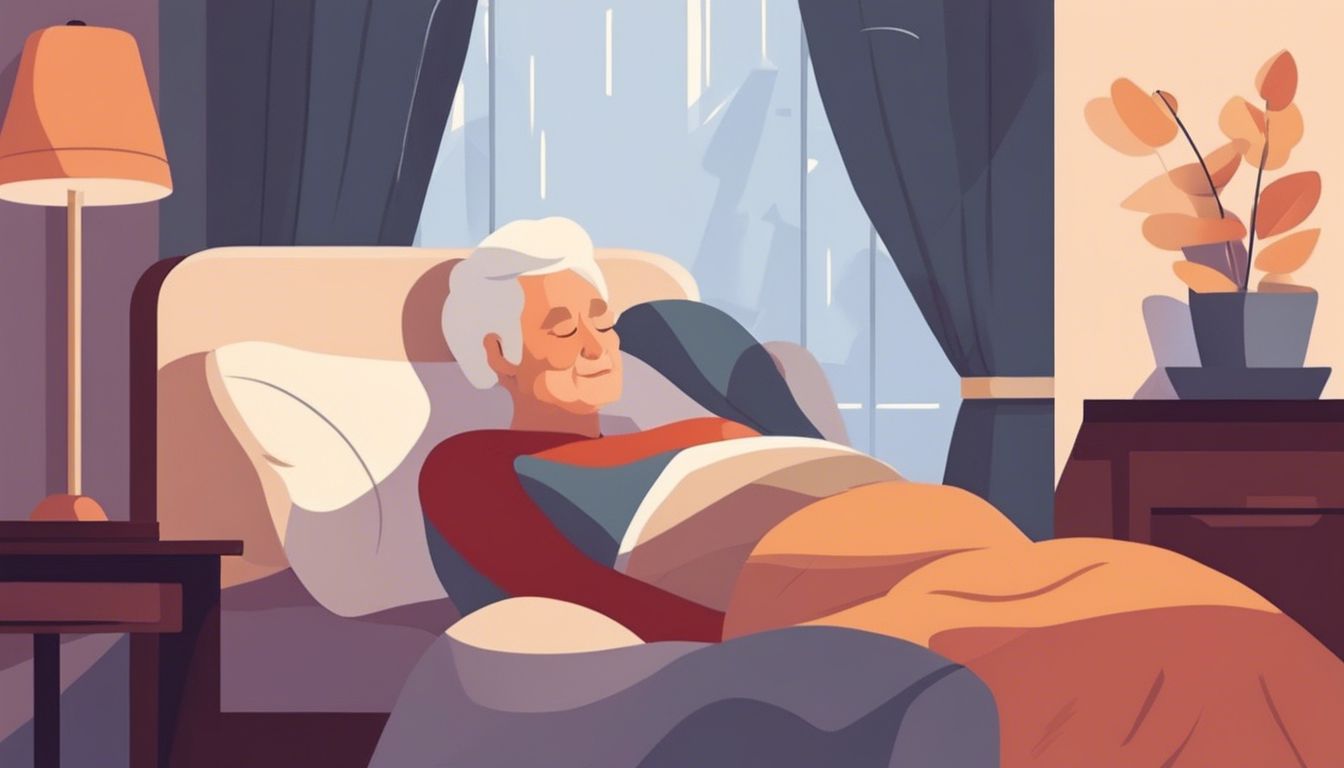Caring for seniors with dementia challenges their sleep. Up to half of those with severe dementia struggle with sleep problems. This article shares ways to promote better rest, focusing on routines and environment adjustments.
Keep reading for helpful tips.
📋✅
- Caregivers can help seniors with dementia sleep better by using bright light during the day and keeping their bedroom dark and cool at night.
- Setting up a stable daily routine, including consistent bedtimes and wake-up times, improves sleep. Limiting naps helps too.
- Activities like walking or puzzles keep seniors active, boosting their sleep quality. Avoid tying them down to keep them safe.
- Doctors sometimes give medicines for sleep problems but natural options like melatonin or chamomile tea are also helpful.
- Support groups and respite care services can help caregivers take breaks and find ways to manage stress.
Understanding Common Sleep Problems in Dementia
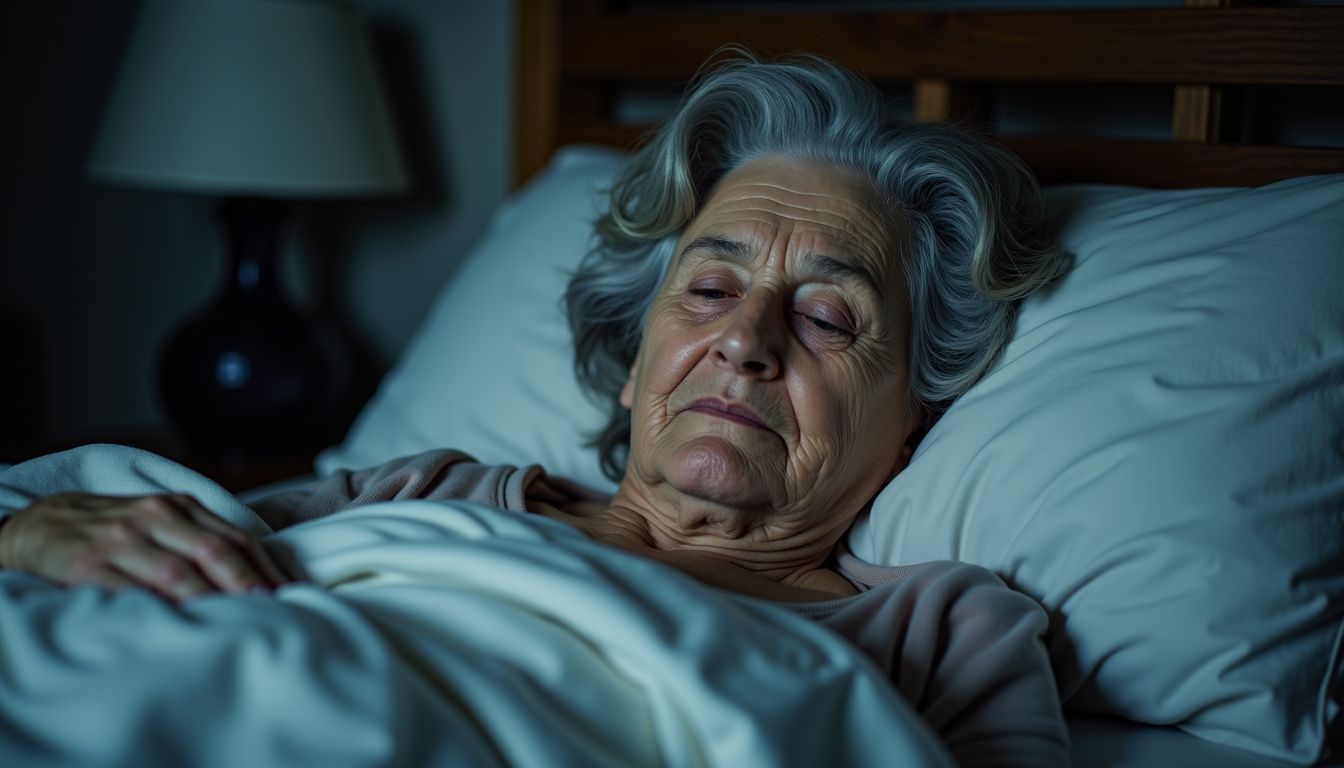
Dementia can mess with a person’s sleep, making nights tough. Aging, illnesses like Alzheimer’s and Parkinson’s disease, and issues like sleep apnea add to the struggle.
Why dementia patients don’t sleep well
Dementia changes the brain in ways that mess up a person’s sleep-wake cycle. These patients might not get enough sunlight during the day, especially in the morning. They often don’t move much all day.
By evening, they are both mentally and physically worn out. Yet, their sleep is still poor.
Low light and shadows at night can make dementia patients scared and confused, leading to worse sleep issues. This fear may keep them awake or cause nightmares. Next, we will discuss how non-drug treatments can help with these sleep problems.
Contributing medical factors
Medical issues can make sleep hard for dementia patients. Depression often ruins their sleep patterns. Restless legs syndrome keeps them tossing and turning. Sleep apnea stops their breath at night, breaking their sleep.
Pain also makes good rest hard to find. All these factors mess up how well they sleep.
Doctors check these health problems to help fix sleep troubles. Treatments might include fixing the leg tingling or using machines for better breathing at night. They give medicine for pain and sadness too.
This way, patients can get more peaceful nights of rest, helping both their minds and bodies feel better.
How aging affects sleep patterns and what changes to expect
Aging changes sleep. Older adults need less sleep. They nap more in the day. This leads to being very sleepy when the sun is up. At night, people with late-stage Alzheimer’s might stay awake for much of it.
Then, they sleep a lot during daylight hours.
The brain also changes as we get older. These changes mess with the body’s clock, known as circadian rhythm. It makes sleeping well hard for seniors with dementia.
Non-Drug Treatments for Sleep Problems
Fixing sleep issues without pills is key. Bright light during the day and a calm, dark room at night help set a natural sleep cycle.
Get the lighting right
Bright light therapy improves sleep for people with dementia. Use lamps that mimic sunlight in the evening. This helps keep their sleep-wake cycles stable. Make sure there is enough light at night to reduce agitation.
Morning sun exposure is good too. It can help them feel alert during the day and sleep better at night. Try to get them outside or near a window when it’s sunny.
Proper lighting can ease dementia patients’ anxiety and improve their overall sleep quality.
Ensure a stable routine
A stable routine helps people with dementia feel safe. Set meals, wake-up times, and bedtimes at the same time every day. This makes their body clock know when to sleep. At night, start calming rituals like dimming lights or playing soft music to signal bedtime is near.
Limit naps during the day so they’re more tired at bedtime. Make sure they wake up and go to bed at consistent times each day too. Sticking to these habits improves their sleep quality and reduces nighttime awakenings.
Keep the patient active during the day
Keeping the patient moving helps a lot. Take them for walks. Have lunch with friends. Do puzzles or other mind games. Spread these activities across the day so they don’t get too tired.
Avoid tying them down. Use tools like motion sensors instead. This keeps patients safe and active, leading to better sleep at night.
Medications and Supplements for Sleep Changes
Choosing the right sleep aids, like melatonin or prescription drugs, can help seniors with dementia rest better. Keep reading to find out more about these options.
Appropriate use of sleep medications
Doctors sometimes give sleeping pills to people with dementia. These might include nortriptyline, lorazepam, or zolpidem. For those with mild-to-moderate Alzheimer’s, Belsomra® works for insomnia.
Yet, these meds should not be a long-term fix. Side effects can happen if used too much.
Next up, let’s talk about nutrients and natural supplements that can help seniors sleep better.
Nutrients and natural supplements to aid sleep
After looking into sleep medicines, let’s talk about nutrients and natural helpers for better sleep. They are good to try if other ways don’t work well. Melatonin is one choice but should be a last resort.
It can help seniors with dementia sleep longer at night. But, it’s important not to rely on it too much.
Magnesium might help calm restless legs, which makes sleeping hard. Always check with a doctor before starting magnesium or any supplement. Herbal options like chamomile tea and valerian root teas are gentle ways to encourage sleep without strong drugs.
They have been used for a long time to help people relax and fall asleep easier.
Managing Night-Time Wakefulness
To help seniors with dementia when they wake up at night, creating a calm space and keeping to familiar night routines can make a big difference. Explore more tips to improve their sleep.
Comforting the patient upon night awakenings
Ask the person what they need. Find out if something hurts or bothers them. Stay calm and don’t argue. Gently tell them it’s night and time to sleep. This helps those with Alzheimer’s feel safe and understand it’s not time to be awake.
Change their bedtime habits or room setup if waking up at night happens often. Maybe a softer light or a different blanket helps. These adjustments can make going back to sleep easier for someone struggling with dementia, like Alzheimer’s disease or Lewy body dementia.
Adjusting nighttime routines and environment
Make the bedroom peaceful for sleep. Set the room temperature to feel comfortable, usually between 60°F and 67°F. Ensure the room stays dark, quiet, and cool to help seniors with dementia sleep better.
Use white-noise devices to block out loud sounds from outside.
Start a calming routine before bed. This could include soothing activities like listening to soft music or reading a simple book together. Such routines signal the brain that it’s time to rest.
Creating a serene environment and establishing predictable bedtime habits play key roles in improving sleep quality for those living with dementia.
Support for Caregivers
Caregivers need help too. They can find support by joining groups online or in their communities. These places give tips, a space to talk, and ways to care for themselves. Taking breaks is crucial.
Services like adult day programs offer these needed pauses. Tools like journals and apps help manage stress. This way, caregivers can stay strong for those they look after. For more ideas on finding balance while caring for others with dementia, keep exploring resources available to you!
Ensuring caregiver rest and self-care
Taking care of yourself is key. You need good sleep to stay patient and upbeat. Try sharing nights with friends or relatives. Look for signs you might need more help as things change.
Next, find resources for extra support.
Utilizing resources for caregiver support
After taking care of oneself, it’s vital for caregivers to know where they can find help. Doctors and local Alzheimer’s groups are key places to start. They provide support and guidance.
You can also look into respite care or in-home professional caregivers for breaks.
Memory care communities give all-day specialized care. This is important for those caring for someone with dementia. Searching for senior living options doesn’t have to be done alone either.
Help is out there; reaching out is the first step.
Conclusion
Caregivers play a key role in promoting good sleep for seniors with dementia. They can do this by setting regular bedtimes and wake-up times, making sure the sleeping area is calm and dark, and keeping seniors active during daylight.
Adding soothing activities before bed helps too. It’s also important to limit naps and avoid caffeine late in the day. By following these steps, caregivers ensure restful nights for their loved ones with dementia.
For a deeper understanding of how aging impacts sleep and the adjustments seniors may face, visit our detailed guide on normal changes to expect in sleep patterns as we age.
FAQs
1. What are common sleep disturbances in people living with dementia?
People living with dementia often struggle with sleep disorders such as difficulty falling asleep, insufficient total sleep time, and excessive daytime sleepiness. These disturbances can be due to dementia itself or other medical conditions like restless leg syndrome and obstructive sleep apnea.
2. How does lack of sleep affect seniors with Alzheimer’s disease or Parkinson’s disease dementia?
Lack of sleep can exacerbate cognitive impairment in seniors suffering from dementias such as Alzheimer’s and Parkinson’s disease. It may increase mood disturbances, contribute to mental health conditions, and further disrupt sleeping patterns.
3. Can medication help manage the sleeping disorder related to dementia care?
Yes! Certain medications like donepezil, temazepam, olanzapine, oxazepam, risperidone and quetiapine can aid in managing the symptoms of a sleeping disorder associated with dementia care but it is important to monitor for any side effects.
4. Are there non-medical interventions that caregivers could use for promoting healthy sleeping habits among those having difficulty sleeping due to dementia?
Absolutely! Caregivers can encourage physical activity during the day while maintaining a consistent bedtime routine at night… They might also consider introducing melatonin supplements or weighted blankets which have been known to promote better rest…
5. Is there a connection between nicotine intake and disturbed REM (Rapid Eye Movement) Sleep behavior among seniors experiencing DLB (Dementia Lewy Bodies)?
Indeed… Nicotine consumption could potentially worsen REM Sleep Behavior Disorder seen often in DLB patients causing them more trouble falling asleep…
6. Where can I find resources about how nursing homes or care homes handle issues related to sleep deprivation among their residents dealing with dementias?
AARP.org provides valuable information on this topic… Similarly Mayo Clinic offers guidelines about handling various aspects of Dementia caregiving including managing problems related to insufficient sleep.
